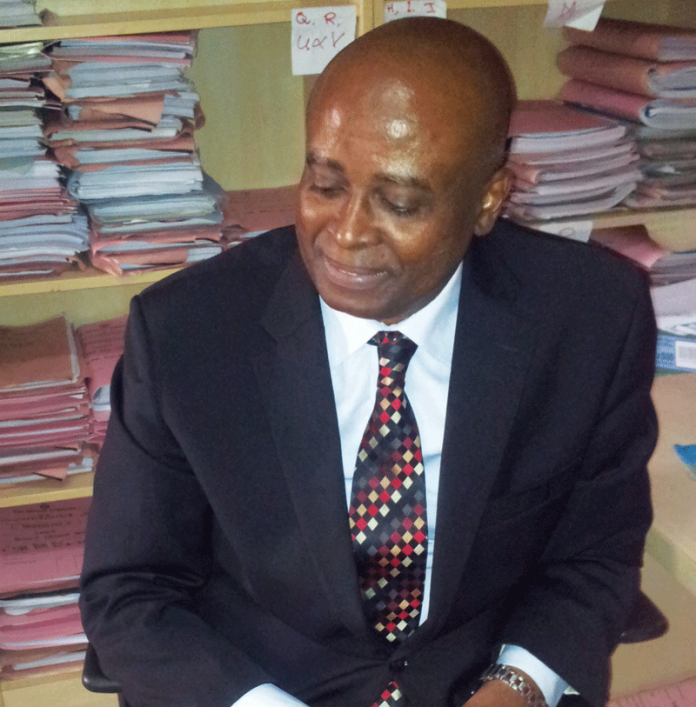•Says Nwabueze is his role model
Chinua Asuzu, a lawyer and solicitor of the Supreme Court of Nigeria, was called to the Bar in 1989. The Dean of The Write House and legal writing consultant, in this interview with Senior Correspondent, ONYEWUCHI OJINNAKA, speaks on the essence of Tax Appeal Tribunal, legal writing and training, law tutors among other issues.
It may be unknown to some corporate organisations and small scale industrialists, who are unjustifiably taxed or over-taxed, that apart from the regular court, there is another place they can seek redress for wrongful taxation.
The setting up of Tax Appeal Tribunal under the Federal Inland Revenue Service (FIRS) Act has provided avenue for aggrieved tax stakeholders to seek redress in issues of tax.
Explaining the function of Tax Appeal Tribunal, Chinua Asuzu, who works at the Tribunal, informed TheNiche that the operation of the court is to adjudicate on tax dispute between tax-payers and tax-collectors or tax authorities such as the FIRS or state revenue authorities.
According to him, any tax dispute before the tribunal is fairly treated.
His words: “Tax-payers are fairly treated and government is fairly treated as well. We make sure that the dispute is amicably treated.”
The tribunal adjudicates cases and reaches a conclusion, he said, and whoever that is owing would be asked to go and pay accordingly; but if the tribunal found that they did not owe, they would be asked to go home.
Through the tribunal, tax-payers are re-assured that tax authorities cannot impose unnecessary taxes on them, abuse them or maltreat them, as there is avenue for them to air their grievances and expected to be heard fairly and fully.
Mostly, it adjudicates on tax matters that affect corporate organisations, said the solicitor, but small investments and private individuals can also seek redress there.
Asuzu disclosed that the tribunal has eight zones all over the country, comprising one in each of the six geo-political zones plus Lagos and Abuja which have their own separate tribunals as well.
Administration and jurisdiction
The tribunal is presided over by part-time commissioners who are referred as administrative judges.
“We are not judges. We are not magistrates. We are not judicial officers; we are part-time. We are lawyers and accountants,” Asuzu explained.
A team of lawyers and accountants manage the tribunal.
Speaking on whether the tribunal can impose punishment on defaulters, Asuzu said it is not a criminal court and has no criminal jurisdiction.
His words: “We cannot judge or jail anybody. All we do is to ascertain that you are owing and ask you to go and pay. We give the order and normal procedure of enforcement will follow.”|
The federal high court can order enforcement, he added.
The Write House
The Write House, Asusu said, is Africa’s frontline team of legal writing consultants, experts, instructors and mentors. “It is a polishing school for lawyers and law students. It was set up to fill the gap in Nigerian law through legal writing consulting and training. It is mostly concerned about plain English in legal writing.”
He posited that plain English is communication, stressing that, generally, legal writing and governmental communication should be in plain English and should not be in legalese. “It should be simple, clear and understandable English that can easily relay the message.”
According to Asuzu, over many centuries, lawyers have developed a dialect of their own, not only in Nigeria but all over the world which was meant to exclude non-lawyers from what they do, adding that it is unfortunate because the work lawyers are doing, apart from the law itself being addressed to the general public, is to serve their clients, most of who are not educated in law. “Clients must understand what their lawyers are doing instead of telling them not to worry and that their cases are being taken care of.”
For him, the client should know what everything is all about, and respond accordingly. “Do not use long sentences that never end; use simple sentences that are short and understandable,” he cautioned.
Asuzu pointed out that Nigerian courts speak a language Nigerians do not understand, and that Nigerians should be able to read contracts and understand what they are signing; hence contracts should be written in plain English.
Law teachers
During the last Nigerian Bar Association (NBA) conference in Abuja, the house was divided on the issue of law teachers who are in active law practice. While some lawyers argued that law teachers are not meant to be seen in courtrooms but confine themselves in lecture rooms, others contend that nothing should stop them from active legal practice in addition to their classroom work.
But Asuzu said those who said that law teachers should not practice are mistaken. “It is a mistake to say law teachers should not practise law. They are required to practise law. It created division because of poverty of thought. It is not an informed view.”
He opined that anybody who says that law teachers should not practise law is talking from primordial point of view. He stressed that law teachers are required to practise, adding that it is one of the requirements for them to teach. “If a lawyer is not practising, he is not qualified to teach law. A law teacher must be required to practise law. If anybody must practise law, it is the law teacher,” he stressed.
Corruption in the Bench
Speaking on the much talked about corruption in the judiciary, Asuzu said that human beings are corrupt, and since they are the managers of institutions, no human institution can be perfect. He said the allegation that judiciary is corrupt could be true or false because it is made up of a lot of judges.
However, he said that it is unfair to generalise that the judiciary is corrupt in its entirety, pointing out that there are many who are not corrupt.
“I know personally some judges who will not consider or compromise their conscience and integrity. It is a very sweeping statement to make” he reasoned.
He rated the Nigerian judiciary above average, saying that what is needed is to appoint people who are honest, brilliant and intelligent, advising that civil service way of promotion should not be followed. “Judicial officers should be paid well because they have challenges. And as human institutions, they cannot be perfect.”
Role model
He picked Professor Ben Nwabueze as his role model, describing him as a very rare gem in law. “He has a rare combination of academic law and expert experience. A very rare legal brain and a quintessential African brain who wrote his thesis and got his Ph.D without entering the four walls of the university. The best Chief Justice Nigeria never had,” Asuzu said.













